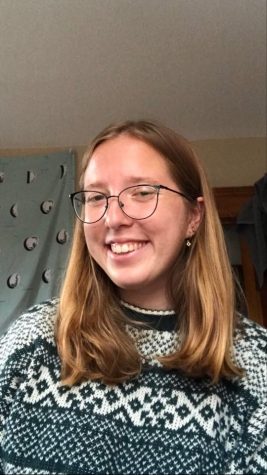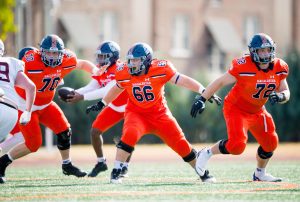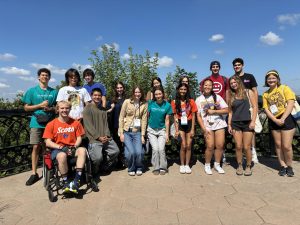MCSG Overseer: LB debates elections versus appointments
February 6, 2020
At this week’s MCSG meeting, the Legislative Body (LB) began a discussion about changing the issue-based officer selection process.
Before the meeting, the LB’s Executive Board had begun a conversation about changing the selection process for the Diversity & Inclusion Officer, the Sustainability Officer and the Community Engagement Officer positions from a student body election to an Executive Board appointment.
The LB took particular interest in the ramifications that this potential change would have for the Diversity & Inclusion Officer.
“Now, the Diversity & Inclusion Officer is seated in the Presidential Committee of Equity and Transformation, composed of various faculty and staff across campus,” MCSG President Blair Cha said. “We were thinking about appointing individuals that have a clear vision and [bring] expertise with them.”
But while people generally agreed that there are potential upsides in changing the appointment process, some representatives were concerned that taking away the student body’s choice would appear undemocratic.
“I think taking the decision away from 500, 600, 800 students of making that choice for who is best to represent campus, and putting that in the hands of three, four, five people — I don’t think is a very good thing to do,” Student Organizations Committee member Kody Harrington ’23 said. “Especially when we’re trying to get campus more involved in what we’re doing and who is representing them.”
The current Diversity & Inclusion Officer Robert Green ’23 was initially taken aback by the discussion — saying that he was not alerted before the meeting that the LB would be debating the future of his position.
“I got elected in this position because I hold critical and valuable skills and views and I don’t think that five people in a room and an advisor are suitable to take that right from me to run for this position,” Green said.
By the end of the meeting, however, Green was more open to continuing the discussion.
“I’m not opposed to making [the officers] appointed,” he said. “It’s just I need to know more about the process. You [Blair] do a lot of work, you need help, and not everyone is as strong as you… I don’t want those key elements of those positions forgotten.”
The LB also heard from two guests this week: Director for Sexual Violence Prevention Education Jen Jacobsen and biology professor Devavani Chatterjea.
Jacobsen, who arrived at the college in October, asked the LB to share their thoughts on how she can better serve Macalester students.
“I think on campus, we have a really good idea of discussing consent,” SSRC member Shreya Nagdev ’22 said. “But then there’s not that discussion of how we can help survivors and how to protect them from their abuser being around campus… I think that is really something that needs to be improved.”
Jacobsen also discussed changing bystander training — moving the campus away from the Green Dot program, which she believes is too narrow in its view on sexual violence prevention.
“Green Dot focuses a lot at the event where the thing is already going wrong,” Jacobsen said. “If you think about having a really proactive approach, some of that is really winding back the week, the month, the year, to think about what things have been set in motion that even allow that to be possible.”
Before she left, Jacobsen passed out cards and asked the LB to write down something they thought she should know as she moves forward in her role.
Later on, Chatterjea presented her proposal for a project to tackle issues of inclusion in Macalester classrooms.
Chatterjea’s goal is to create a way to measure how successful faculty members are at creating safe and inclusive environments. In addition to tools for evaluation, she hopes to develop trainings for professors to improve classroom environments.
“Our idea is to gather these data for a number of years without the faculty member getting that information right away,” she said. “We are trying to get population-level data. We’re trying to understand [if] these patterns shift with the capacity building we plan to do.”
Chatterjea got the idea while working on the Strategic Planning and Analysis Committee (SPAC), where she listened to students talk about how they feel disconnected from the community.
“Students have been telling us and telling us and telling us we need to do something,” Chatterjea said. “I hear you. Our idea right now is to convene a student and recent graduate council during the course of this project.”
After the presentation and a few questions from the LB, Cha asked the room to continue to consider how they could help Chatterjea execute her project.
While Chatterjea’s proposal is currently being considered for a Howard Hughes Medical Institute grant, she hopes that it will go forward regardless of that application’s success.
The LB also voted on and passed several measures during the meeting — first a $2,281 additional allocation for Mac First Aid to buy an airway management trainer, then the Lectures Coordination Board speaker for this spring: world champion fencer Ibtihaj Muhammad, who became the first woman to compete in a hijab in the Olympics in 2016.
Toward the end of the meeting, the LB voted to add Grace Reardon ’21 to the Election Procedures Commission. Reardon will replace Ryan Perez ’20, who stepped back from the commission earlier this year.
At next week’s meeting, representatives will continue to discuss the issue-based officer selection process.












